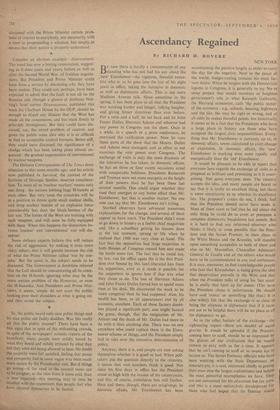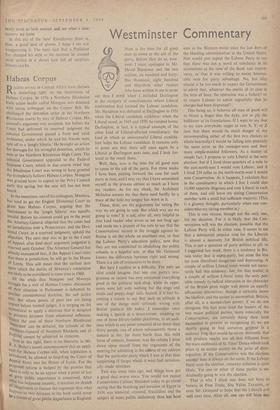Ascendancy Regained
By RICHARD H. ROVERE NEW YORK Y now there is hardly a commentator of any nstanding who has not had his say about the ,'new' Eisenhower—the vigorous, forceful execu- tive who is, as he goes into the last of his eight years in office, taking the initiative in domestic as well as diplomatic affairs. This is not mere Madison Avenue talk. Since sometime in the spring, it has been plain to all that the President was working harder and longer, talking tougher, and giving firmer directives than ever before. For a term and a half, he sat back and let John Foster Dulles, Sherman Adams and whoever had any power in Congress run the show. Once in a while, in a speech or a press conference, he exercised the ratification power. Now he runs those parts of the show that the Messrs. Dulles and Adams once managed, and as often as not exercises the veto power over Congress. The exchange of visits is only the most dramatic of the initiatives he has taken; in domestic affairs, he has on three or four recent occasions acted with comparable boldness. Presidents Roosevelt and Truman were not more energetic at the height of their powers than he has been these last several months. One could argue whether they used their energies to any better effect than Mr. Eisenhower, but that is another matter. No one now can say that Mr. Eisenhower isn't trying.
Startled observers have advanced numerous explanations for the change, and several of them appear to have merit. The President didn't want to go down in history as a feeble chief magistrate and, like a schoolboy getting his lessons done at the last moment, sprang to life when he realised that 1960 was very close at hand. The fact that the opposition had large majorities in both Houses of Congress roused him and made the battle more fun. The fact that he could not, by law, run for office again (he is the first Presi- dent ever bound by this law) liberated him from his supporters, even as it made it possible for his supporters to ignore him if that was what they chose to do. The loss of Sherman Adams and John Foster Dulles forced him to spend more time at his desk. He discovered the work to be more congenial than he had supposed. Also, his health has been, to all appearances and by all accounts, excellent. Each of these factors doubt- less played a significant part; one might hazard the guess, though, that the resignation of Mr. Adams and the death of Mr. Dulles had more to do with it than anything else. There was no one anywhere who could replace them in the Eisen- hower scheme of things, and the President simply had to take over the executive determination of policy.
Anyway, there it is, and people are now asking themselves whether it is good or bad. When poll- takers put the question directly to the citizenry, it seems that vast numbers think it good. Not since his first days in office has the President stood so high with the masses of his countrymen, and this, of course, emboldens him still further. Here and there, though, there are misgivings. In domestic affairs, Mr. Eisenhower has been accentuating the positive largely in order to carry the day for the negative. Next to the peace of the world, budget-cutting remains his most fer- vent desire. When he tangles with the Democratic legions in Congress, it is generally to say No to some project that would maintain or heighten government's role in what Kenneth Galbraith, the Harvard economist, calls 'the public sector' of the economy : e.g., schools, housing, highways and the like. He may be right'or wrong, and at all odds he makes forceful points, but historically it seems to be a fact that the Presidents who have a large place in history are those who have accepted the largest, civic responsibilities. Every- thing that Mr. Eisenhower is currently up to, in domestic affairs, seems calculated to avert change or expansion. In domestic affairs, the 'new' Eisenhower is marking time more rapidly and energetically than the 'old' Eisenhower.
It would be pleasant to be able to report that everyone here regards the exchange of visits as a proposal as brilliant and promising as it is enter- prising. Not quite everyone does. The country accepts the idea, and many people are heard to say that it is really an excellent thing, but there is some uncertainty as to wherein its excellence lies. The proposal's critics do not, I think, feel that the President should never have made it. Most of them seem to feel that he did about the only thing he could do to avert or postpone a complete diplomatic breakdown last month. But it is hard to find any informed observer who thinks it likely or even possible that the Presi- dent and the Soviet Premier, in their chats in the White House and the Kremlin, will stumble upon something acceptable to both of them and also to Mr. Macmillan, Chancellor Adenauer, General de Gaulle and all the others who would have to be accommodated in any real settlement. It is easy, moreover, to find knowledgeable people who fear that Khrushchev is being given the idea that desperation prevails in the West and that when the President talks of using his 'last atom' he is really that hard up for atoms. (The term the President chose is unfortunate. He should have said 'ounce' or something like that.) It is also widely felt that the exchange is so close to being the ultipate in diplomacy that if it turns out not to be helpful there will be no place at all for diplomacy to go.
As to the other feature of the exchange--the sightseeing aspect—there are doubts of equal gravity. It would be splendid if the Premier, coming here to scoff, should be so impressed by the glories of our civilisation that he would remain to pray with us for a time. It appears that he isn't coming to scoff or to swoon but lo lecture us. The Soviet Embassy officials who have been working with the State Department on itinerary are, it is said, interested chiefly in getting their man into the largest auditoriums and before the most powerful microphones we have. They are not concerned for his education but for ours, and this is a most melancholy development for those who had hoped that the Premier would
really want to look around and see what a nice country we have.
In this era of the 'new' Eisenhower .there is, then, a good deal of gloom. I hope I am not exaggerating it. The mere fact that a Pregident has changed his style at the moment he seemed most settled in it shows how full of surprises history can be..



































 Previous page
Previous page